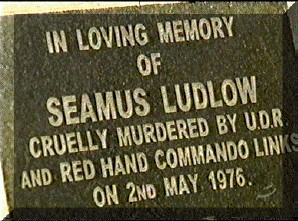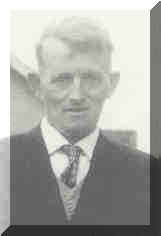


The Murder of Seamus Ludlow in County Louth, May 1976. Towards a public inquiry?
|
The Murder of Seamus Ludlow in County Louth, May 1976. Towards a public inquiry? |
|
|
The Irish News, 5 November 2005: Ludlow family call for public inquiry into death By Barry McCaffrey and Maeve Connolly The family of a Co Louth man murdered in 1976 have called for an independent public inquiry into hids death. A nephew of Seamus Ludlow last night said the Irish government report "didn't go far enough" and had raised questions which still needed to be answered. Published two days ago, the Baron Report found that two UDR soldiers were implicated in the forestry worker's murder but gardai took no action for nearly 20 years. Mr Ludlow was abducted and shot dead by loyalist gunmen while hitching a lift near Dundalk in May 1976. The IRA was initialy blamed for the murder but within a year the RUC had information implicating four Co Down loyalists. However, despite being informed of the identities of the four main suspects, gardai made no attempt to interview them for almost 20 years. Michael Donegan said a public inquiry would reveal more about the murder and ubsequent investigation and compel people to cooperate. "There was a cover-up and it went to a very high level in the gardai at least. Someone at a high level ordered the murder investigation to be curtailed,2 he said. "Mr Justice Barron's investigation was to a large extent voluntary and it's obvious the British refused to cooperate with him. We don't know who he spoke to. The people who haven't helped him got off lightly because we don't know who they are." In February 2000 the Irish government established an inquiry to examine the Garda investigation. The move followed a four-year campaign by the Ludlow family for an investigation into the 47-year-old's murder. The Barron Inquiry confirmed that the RUC had offered to arrange interviews with two of the suspects but the ofer was never taken up by the gardai. The four suspects, all from the Killyleagh area of Co Down, were eventually interviewed by RUC officers at Castlereagh in February 1998. during interviews Paul Hosking claimed he could not understand why he was being questioned as he had already admitted to Special Branch officers in 1986/87 that he had been present at the murder. Recounting the murder, Hosking told detectives in 1998: "We picked up this man, we gave him a lift because he was thumbing, and then they took him up the road and shot him. "It was terrible. I have lived with this for years." Hosking denied involvement in the killing itself and claimed that another suspect, Samuel 'Mambo' Carroll, had shot Mr Ludlow. He also recalled how one of the four loyalists, James Fitzsimmons, had used his UDR identity pass at a checkpoint when entering the Republic. Under questioning, Fitzsimmons admitted that he drove the car used in the murder to Dundalk and back to Killyleagh following the shooting. "We stopped. I don't know. I don't know to be honest with you," he said. "I just don't know...I heard bang, bang, bang. "It nearly took my ears off. It was awful loud." UDR soldier Richard Long and Carroll both denied involvement or knowledge of the murder. Long had been sentenced to life for the murder of a Protestant man who was had been mistaken for a Catholic. David Spratt (23) was murdered less than a month after the Ludlow killing. Carroll had been sentenced to four years in prison for possession of a firearm and ammunition in suspicious circumstances. Despite the confessions, an RUC report to the Director for Public Prosecutions said: "From the papers contained in this file there is no evidence to connect Long and Carroll with the murder of Seamus Ludlow. "If one accepts the truthfulness of Hosking and Fitzsimmons, I consider the facts and evidence fall short of the standard of proof required to substantiate a charge of murder against them." However, the most damning aspects of the Barron Report relate to thefact that gardai failed to take any action against the four suspects, despite being provided with information in 1979. An internal Garda report in November 1998 concluded there were "no indications as to what developments, if any, were taking place in regard to to suspects; no record of any direction as to what action was to be taken or by whom against the susprects". "In short the documentation does not provide any clear indication as to what precise plan of action, if any, was being followed and by whom." Questioning why Garda failed to act on the 1979 information, the report concluded: "From the evidence available to it, the inquiry believes that the only credible explanation for the failure to pursue these suspects is that a direction was given which led the investigating officer, D/Supt Dan Murphy, to abandon plans to have the suspects interviewed outside the jurisdiction. "As to why such a direction might have been issued, only one credible explanation has been ofered, that it was done in order to avoid a situation where garda might feel obliged to reciprocate by allowing RUC officers to attend interviews of suspects in the state." The report further criticised the Garda investigation by confirming that documents were either missing or never existed. Files elating to the four main suspects, two bullets found at the murder scene and photographic records of certain fingerprints have all disappeared. Mr Donegan saifd the family had been unhappy with the gardai's treatment of themn since the day Mr Ludlow had been murdered. "There was no real respect from the gardai then and none since," he said. "A lot of apologies are called for, from gardai, the government and the British security forces. "We are not interested in the killers any more - no one is going to be charged."
I Homepage I I Top I I Barron Report is Published I |